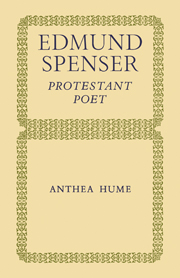2 - ‘Maye’, ‘Iulye’ and ‘September’
Published online by Cambridge University Press: 18 February 2010
Summary
One of the functions of the eclogue, William Webbe reminded readers in 1586, was to give the poet an opportunity to ‘enueigh grieuously against abuses’. When he considered the case of the pastoral poem recently published by ‘Master Sp.’, he noted that the ‘Iulye’ eclogue attacked ‘idle and ambitious Goteheardes’ and that ‘ September’ exposed ‘the loose and retchlesse lyuing of Popish Prelates’. At the same time he was by no means insensitive to the ‘delight’ which a reader might take at the poet's ‘learned conueyance’. Webbe's opinion that purposeful satirical attack was central to the ecclesiastical eclogues is not on the whole shared by recent students of The Shepheardes Calender. Instead, Spenser's characteristic stance as a pastoral poet is thought to be one of ‘balance’ or ‘ambivalence’ in relation to the opposing views put forward within particular eclogues. Neither the attitudes of Piers on the one side, for example, nor those of Palinode on the other can be taken to carry the poet's endorsement – on the contrary, Spenser exposes the strengths and weaknesses of both. This is the reading briefly proposed by William Nelson in the book mentioned in the previous chapter, and worked out in a full-length study by Patrick Cullen. Nancy Jo Hoffman ends a chapter on the religious eclogues with the claim that Spenser in the Calender chose not to ‘align himself dogmatically with the Geneva reformers’ but envisaged a ‘continual, healthy tension’ in man's attempt to know a good life in God. ‘Balance’, ‘tension’, ‘plurality of values’, are key terms for the articulation of modern experience of the poem.
- Type
- Chapter
- Information
- Edmund SpenserProtestant Poet, pp. 13 - 40Publisher: Cambridge University PressPrint publication year: 1984



